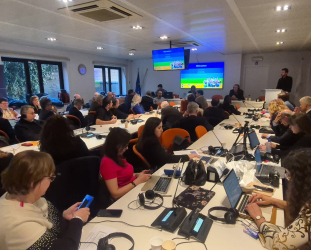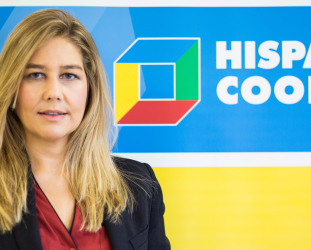Local authorities and cooperatives are key to citizen energy transition
25.06.2014 08:26:18

Download
Brussels – June 25, 2014
Citizens can play an active role in Europe’s energy market in the future, a major international event on renewable and efficient energy will hear this week.
Legal and financial barriers currently prevent citizens from participating more effectively in decisions about Europe’s energy generation, but these can be overcome with help from local governments and cooperatives, as Friends of the Earth Europe, Climate Alliance, REScoop.eu, Cooperatives Europe, CECODHAS and Euro Coop will say during the event on the 26th of June.
The week brings together public authorities, cooperatives, campaign groups and high-level representatives from the European institutions. Participants will learn that cooperatives and local governments play an essential role in bridging the gap between producers and consumers of energy.
Cities should promote a cost-efficient energy model by decentralising electricity production and centralising heat through cooperative ownership of renewable energy, as will be shown at the event.
Cooperative production of renewable energy in Europe is an exponentially growing movement with thousands of community and citizen energy projects all over Europe. Cooperatives, NGOs and other networks together with local authorities will present concrete solutions on how to reduce the costs of capital for renewable initiatives at the EU level, overcome legal barriers and enable citizens to contribute to a safer climate. Also, consumer cooperatives play a key role in informing and educating consumer members to the benefits of a decentralised energy model which makes sure that aware and empowered citizens are at the centre.
Local governments hold the key to unlocking the potential in local and cooperatively owned energy. In particular local municipalities are well-placed to distribute financial aid to get new energy co-ops off the ground.
“The partnership between citizens and their local authorities is fundamental in setting up local initiatives in the field of climate and energy and allowing the optimum mobilisation of local energy resources close to where the energy is consumed” said Thomas Pensel, from the City of Mainz, member of Climate Alliance.
Dirk Vansintjan, president of REScoop.eu, said: Throughout the REScoop 20-20-20 IEE project we found out that starting REScoops could use a revolving fund that gives them time to gather more members and more equity and rely less on bank loans. Now it is time to seize the opportunity!”
The benefits that can be unlocked with the right support for cooperative energy are many but of particular interest is a decreased reliance on precarious fossil fuel imports and a potential reduction in energy price.
Carmela Favarulo, Director of Programmes of Education to Responsible Consumption at ANCC/Coop said: “Consumer cooperatives are consumer owned retailers which put sustainability at the very heart of their action. Raising awareness, educating and eventually empowering consumers to make sustainable consumption choices is for them a key mission which should be acknowledged and further supported by public authorities both at EU and Member-State level”.
“The energy transition is much more than simply liberalising the EU’s energy markets. It’s about democratising the production and delivery of the most basic need of citizens – heat and electricity. Renewable energy and ICT technology have been key drivers in making decentralised energy systems possible and feasible. Citizens are already contributing in the millions to this sustainable energy transition – European legislators need to walk the talk now in truly unleashing the power of the European citizens rather than remaining stuck in the fossil-based, centrally organised past.” said Klaus Niederländer, Director of Cooperatives Europe.
For more information contact: Rosita Zilli, Euro Coop - Email: [email protected]
NOTES:
- Event outline: How can the EU efficiently enhance the role of citizens and cities in the energy transition? What can be done at the EU level to put forward a decentralized and collaborative framework for a sustainable and less dependent EU energy market? Panel discussion followed by an audience debate. The panel will be:
- Dirk Vansintjan (BE), REScoop.EU - Financing of renewables: New financing approaches by local citizen-led initiatives.
- Carmela Favarulo (IT), ANCC/Coop (IT) Reducing energy costs: Consumer Engagement in the Energy Transition: the “Eco-Courts case”
- Thomas Pensel, City of Mainz, How can the local authority support citizen-based initiatives:
- Josh Roberts, Client Earth Legal barriers for Community-power projects and how they can be overcome:
- Examples of community and cooperative projects can be found at www.communitypower.eu/en/inspiring-stories.html
- Organisations involved
Climate Alliance unites 1,700 cities and municipalities in Europe committed to global climate change mitigation.The member cities and municipalities aim to reduce greenhouse gas emissions at their source by ten percent every five years.www.climatealliance.eu
Cooperatives Europe is the voice of cooperative enterprises in Europe. On behalf of its 83 member organisations from 33 European countries across all business sectors it promotes the cooperative business model in Europe. Its members represent 123 million individual member cooperators. www.coopseurope.coop
Euro Coop unites 20 national organizations of consumer cooperatives across Europe. It represents over 4,500 local and regional businesses, which serve 30 million consumer-members and employ 450,000 people. www.eurocoop.coop
Friends of the Earth Europe campaigns for sustainable and just societies and for the protection of the environment. They unite more than 30 national groups with thousands of local groups. www.foeeurope.org
REScoop.eu is the European federation of groups and cooperatives of citizens for Renewable Energy. The federation wants to represent the voice of approximately 2,500 European REScoops in Brussels. – www.rescoop.eu
Housing Europe is the European Federation of Public, Cooperative & Social Housing. Representing 41 national & regional federations, the organisation gathers about 41.400 providers in 19 countries who manage over 25 million homes, about 12% of existing dwellings in the EU. www.housingeurope.eu/
Latest Sustainability Policy news

Euro Coop and Partners Demand Streamlined Green Claims Directive
Brussels, 23 April 2025 – Euro Coop, together with HOTREC and Independent Retail...

Safeguarding the Single Market: Joint Call to the European Parliament on Cross-Border Enforcement of UTPs
Brussels, 22 April 2025 – Euro Coop and Independent Retail Europe have sent a joint...

Cooperatives Driving Change: Key Events in Brussels, March 2025
As part of the International Year of Cooperatives, a series of impactful events took place in...
Latest Sustainability Policy stories

Coop Norway’s discount chain, Extra, receives prize for healthy marketing and celebrates with additional discount on fruit and vegs
Coop Norway’s discount chain, Extra, has been recognized for its commitment to healthier...

Coop Private Label Products Shine at the 2025 European Private Label Awards
The 2025 European Private Label Awards have celebrated the achievements in store brand...

Empowering Consumers for a Sustainable Future: An Interview with HISPACOOP for World Consumer Day
On the occasion of World Consumer Day, we highlight the essential role of consumer...

